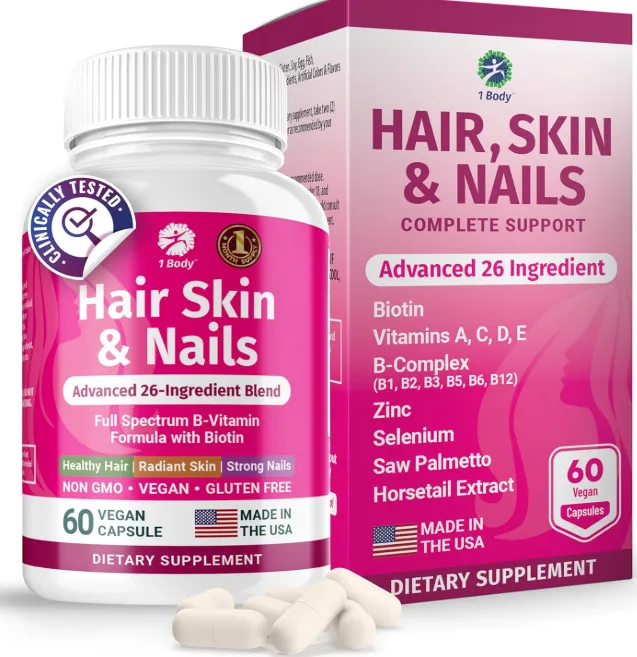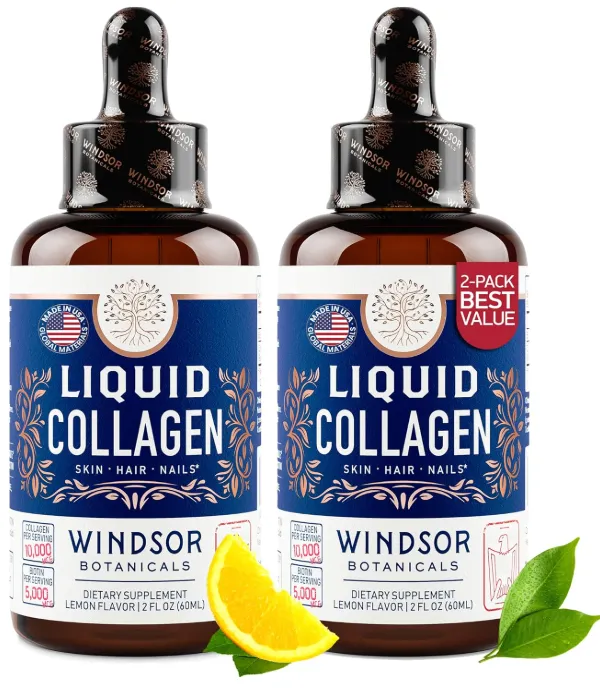Collagen with Hyaluronic Acid and Biotin: The Ultimate Beauty Trio
Collagen with Hyaluronic Acid and Biotin. In the world of beauty and wellness supplements, few combinations have garnered as much attention as collagen paired with hyaluronic acid and biotin. This powerful trio has become increasingly popular among those seeking to enhance their skin, hair, and nail health from within. But what makes this combination so special, and does the science support the hype? Let’s explore the comprehensive benefits, research, and practical considerations of this beauty supplement powerhouse.
Understanding the Individual Components
Collagen: The Structural Foundation
Collagen is the most abundant protein in the human body, making up approximately 30% of our total protein content. It serves as the primary structural component of our skin, hair, nails, bones, and connective tissues. As we age, our natural collagen production begins to decline by about 1% per year starting in our mid-20s, leading to visible signs of aging such as wrinkles, sagging skin, and brittle nails.
Scientific Evidence for Collagen Supplements:
Recent clinical trials have provided compelling evidence for collagen supplementation. A 2024 systematic review published in The American Journal of Medicine analyzed 23 randomized controlled trials and found that collagen supplements significantly improved skin hydration, elasticity, and wrinkles. Specifically, one notable study showed that after 12 weeks of supplementation, participants experienced:
- 13.8% increase in skin hydration
- 22.7% improvement in skin elasticity
- Visible reduction in wrinkle depth and fine lines
The mechanism behind these benefits lies in collagen’s ability to stimulate the body’s own collagen production and provide the amino acids necessary for protein synthesis, particularly glycine, proline, and hydroxyproline.
Marine Collagen vs Bovine Collagen. Collagen has become one of the most sought-after supplements in recent years, with consumers turning to these products for skin health, joint support, and other potential benefits. With multiple sources available, many people wonder which type is best for their specific needs. In this comprehensive guide, we’ll explore the key differences between marine collagen and bovine collagen, examining their sources, compositions, benefits, and ideal uses.
Hyaluronic Acid: The Hydration Powerhouse
Hyaluronic acid (HA) is a naturally occurring substance in our bodies, with the highest concentrations found in our skin, eyes, and joints. Its remarkable ability to hold up to 1,000 times its weight in water makes it an exceptional moisturizing agent. Like collagen, hyaluronic acid production decreases with age, contributing to skin dryness and the formation of fine lines.
Research on Hyaluronic Acid Supplementation:
A comprehensive review published in PMC in 2023 examined multiple studies on oral hyaluronic acid supplementation and found that:
- Oral HA administration significantly promoted skin hydration after 2-8 weeks in both young and elderly groups
- Participants experienced improvements in skin tone and texture
- The molecular weight of HA affected its bioavailability, with lower molecular weight forms showing better absorption
According to Cleveland Clinic, hyaluronic acid benefits include:
- Enhanced soft tissue growth
- Stimulation of collagen and elastin production
- Improved skin moisturization
- Increased skin elasticity
- Reduced scarring and faster wound healing
WINDSOR BOTANICALS Liquid Collagen for Women and Men – Hair, Skin, Nails Vitamins – Lemon Flavor Collagen Peptides Hair Growth Drink – 5,000mcg Biotin, 10…
GLOSSY HAIR, GLOWING SKIN. Concentrated collagen drops womens formula supporting keratin and elastin levels for hair and nail growth. Balanced oil and hydration and noticeable anti-aging results.

1 Body Hair Skin and Nails Vitamins with Biotin – Contains 26 Vitamins, Minerals and Herb Extracts – Hair and Nail Growth, Glowing Skin Supplements Formula…
Grow Hair Longer, Faster – Allow mother nature to give you a surge of hair regrowth from a bounty of hair vitamins that nourish each follicle for more volume, shinier hair, & healthier roots.
Biotin: The Hair and Nail Specialist
Biotin, also known as vitamin B7 or vitamin H, is a water-soluble vitamin that plays a crucial role in the metabolism of fats, carbohydrates, and proteins. It’s particularly important for the synthesis of keratin, the protein that forms the structure of hair, skin, and nails.
The Reality of Biotin Research:
While biotin is widely marketed for hair growth, the scientific evidence presents a more nuanced picture. A comprehensive review published in PMC states that “despite its popularity in the media and amongst consumers, biotin has no proven efficacy in hair and nail growth of healthy individuals.”
However, the research does show that:
- Biotin supplementation is effective for individuals with biotin deficiency
- People with underlying conditions affecting biotin metabolism may benefit from supplementation
- Most healthy individuals already consume adequate biotin through their diet
It’s important to note that true biotin deficiency is rare in developed countries, occurring primarily in people with genetic disorders, chronic alcohol consumption, or those on certain medications.
The Synergistic Benefits of the Trio
Enhanced Absorption and Bioavailability
When combined, these three components may offer synergistic benefits that exceed their individual effects. The combination works on multiple levels:
- Collagen provides the structural framework and amino acid building blocks
- Hyaluronic acid enhances moisture retention and creates an optimal environment for skin health
- Biotin supports the metabolic processes necessary for protein synthesis
Scientific Evidence for Combined Supplementation
A groundbreaking study published in PMC in 2024 examined a combination supplement containing collagen, hyaluronic acid, biotin, and vitamins C and E. The research, titled “Efficacy and Safety of Skin Radiance Collagen,” found significant improvements in multiple parameters:
Skin Benefits:
- Enhanced skin elasticity
- Increased skin hydration
- Reduction in crow’s feet area wrinkles and fine lines
- Decreased skin roughness
- Improved overall skin radiance
Hair Benefits:
- Reduced hair fall
- Improved hair texture and shine
- Enhanced hair strength
The study concluded that the combination showed “significant improvement in skin and hair health” compared to individual components alone.
Clinical Studies and Research Findings
Major Clinical Trials
Collagen Research Highlights:
- 12-Week Hydrolyzed Collagen Study (2024): Participants taking hydrolyzed collagen supplements showed measurable improvements in skin density, collagen content, and overall skin appearance.
- Meta-Analysis of 23 Studies (2025): The largest review to date found consistent benefits across multiple randomized controlled trials, with collagen supplements significantly improving skin hydration, elasticity, and wrinkle appearance.
- Long-term Safety Study: Research spanning up to 6 months showed that collagen supplementation was well-tolerated with minimal side effects.
Hyaluronic Acid Research:
- Asian Population Study (2023): A 12-week study on healthy Asian adults aged 35-64 demonstrated that oral hyaluronic acid improved wrinkle control and skin condition significantly.
- Molecular Weight Study: Research showed that lower molecular weight hyaluronic acid (50-200 kDa) had better oral bioavailability than higher molecular weight forms.
Biotin Research Limitations:
While individual biotin studies are limited for healthy populations, research on combination supplements containing biotin shows promising results, suggesting that biotin may play a supportive role when combined with other nutrients.
Optimal Dosages and Timing
Recommended Daily Dosages
Based on clinical research, the effective dosages are:
Collagen:
- Hydrolyzed collagen peptides: 2.5-10 grams daily
- Most studies use: 5-10 grams daily for skin benefits
- Timing: Can be taken with or without food, often recommended in the morning
Hyaluronic Acid:
- Oral supplementation: 120-240 mg daily
- Clinical studies typically use: 120 mg daily
- Timing: With meals to enhance absorption
Biotin:
- RDA for adults: 30 mcg daily
- Supplement dosages: 2.5-10 mg (much higher than RDA)
- Safety note: Biotin is water-soluble, so excess amounts are excreted
Factors Affecting Absorption
Several factors can influence the effectiveness of these supplements:
- Age: Older individuals may see more dramatic results due to greater baseline deficiencies
- Diet: A balanced diet rich in vitamin C enhances collagen synthesis
- Lifestyle factors: Smoking, excessive sun exposure, and poor sleep can counteract benefits
- Consistency: Regular, long-term use is necessary for optimal results
Potential Benefits and Expected Timeline
Short-term Benefits (2-4 weeks)
- Improved skin hydration
- Slight enhancement in skin plumpness
- Reduced skin dryness
- Initial improvements in nail strength
Medium-term Benefits (6-12 weeks)
- Visible reduction in fine lines
- Enhanced skin elasticity
- Improved hair texture and shine
- Stronger, less brittle nails
- More even skin tone
Long-term Benefits (3-6 months)
- Significant improvement in wrinkle depth
- Enhanced skin firmness
- Reduced hair breakage and fallout
- Improved overall skin radiance
- Better wound healing
Safety Profile and Side Effects
Generally Recognized as Safe
All three components have excellent safety profiles when taken at recommended dosages:
Collagen:
- Minimal side effects reported
- Rare cases of digestive upset
- No known drug interactions
- Safe for long-term use
Hyaluronic Acid:
- Well-tolerated at recommended doses
- Rare allergic reactions
- May cause mild digestive symptoms in sensitive individuals
- No significant drug interactions
Biotin:
- Extremely safe, even at high doses
- Water-soluble vitamin with low toxicity risk
- Can interfere with certain lab tests (important to inform healthcare providers)
- May cause minor skin reactions in rare cases
Who Should Exercise Caution
Certain groups should consult healthcare providers before supplementation:
- Pregnant or breastfeeding women
- Individuals with autoimmune conditions
- People taking blood-thinning medications
- Those with known allergies to any components
- Individuals scheduled for laboratory tests (due to biotin interference)
Choosing Quality Supplements
Key Quality Indicators
When selecting a collagen, hyaluronic acid, and biotin supplement, look for:
Manufacturing Standards:
- Third-party testing for purity
- GMP (Good Manufacturing Practice) certification
- NSF or USP verification
- Transparent labeling with exact ingredient amounts
Collagen Specifications:
- Hydrolyzed collagen peptides (better absorption)
- Type I and III collagen (most beneficial for skin)
- Marine or grass-fed bovine sources
- Low molecular weight (2-5 kDa for optimal absorption)
Hyaluronic Acid Specifications:
- Low molecular weight HA (50-200 kDa)
- Clearly stated molecular weight on label
- Sodium hyaluronate form (more stable)
Additional Beneficial Ingredients:
- Vitamin C (enhances collagen synthesis)
- Vitamin E (antioxidant protection)
- Zinc (supports collagen formation)
- Silica (supports hair and nail health)
Lifestyle Factors That Enhance Results
Dietary Considerations
To maximize the benefits of supplementation:
Support Collagen Production:
- Consume vitamin C-rich foods (citrus fruits, berries, leafy greens)
- Include zinc sources (nuts, seeds, legumes)
- Eat sulfur-rich foods (eggs, garlic, onions)
- Maintain adequate protein intake
Hydration:
- Drink 8-10 glasses of water daily
- Limit alcohol consumption
- Reduce caffeine intake
- Include water-rich foods in your diet
Skincare Complementary Practices
Sun Protection:
- Use broad-spectrum SPF 30+ daily
- Wear protective clothing
- Avoid peak sun hours
- Use antioxidant serums
Gentle Skincare Routine:
- Use mild, fragrance-free cleansers
- Apply topical hyaluronic acid serums
- Include retinoids (with professional guidance)
- Moisturize regularly
Cost-Benefit Analysis
Investment Considerations
Quality combination supplements typically range from $30-80 per month, depending on:
- Brand reputation and quality
- Concentration of active ingredients
- Additional beneficial compounds
- Packaging and delivery method
Comparing to Alternatives:
- Professional cosmetic treatments: $200-2000+ per session
- Topical skincare products: $50-300+ monthly
- Injectable treatments: $500-1500+ per session
Value Proposition
When compared to invasive procedures or high-end topical treatments, oral supplementation offers:
- Lower cost per month
- Systemic benefits (hair, nails, joints)
- Minimal side effects
- Convenience of daily supplementation
- Gradual, natural-looking improvements
Future Research and Developments
Emerging Research Areas
Current research is exploring:
- Optimal molecular weights for enhanced absorption
- Synergistic effects with other nutrients
- Personalized supplementation based on genetic factors
- Novel delivery methods (liposomal, nanoparticle)
- Targeted formulations for specific age groups
Technological Advances
The supplement industry is developing:
- More bioavailable forms of each component
- Sustained-release formulations
- Combination products with enhanced stability
- Precision dosing based on individual needs
Real-World Results and Expectations
Setting Realistic Expectations
While the combination of collagen, hyaluronic acid, and biotin can provide significant benefits, it’s important to maintain realistic expectations:
(What do fleas look like. The problem begins with some scratching here and there. Maybe you spot some tiny specks around the house that you might’ve missed before. Maybe your pet’s beautiful hair that was so thick is looking a tad thin these days. Before you know it … yep. It’s confirmed.)
What to Expect:
- Gradual improvements over 3-6 months
- Enhanced hydration and skin plumpness
- Reduction in fine lines (not deep wrinkles)
- Improved hair and nail strength
- Better overall skin texture
What Not to Expect:
- Dramatic overnight transformations
- Complete elimination of aging signs
- Results equivalent to surgical procedures
- Benefits that persist after discontinuation
Individual Variation
Results can vary significantly based on:
- Starting age and baseline condition
- Genetic factors
- Overall health and nutrition status
- Lifestyle factors (stress, sleep, exercise)
- Consistency of supplementation
Within the human body, 29 types of collagen have been identified, with three types making up the vast majority.
These are the types you’ll usually find in a collagen supplement:
- Type I
This type is found in bones, ligaments, tendons and skin for elasticity and strength. The supplement source comes from bovine and fish. - Type II
This type is cartilage. The supplement source comes from chicken cartilage and joint. - Type III
This type is found alongside type I in skin, blood vessels and internal organs. The supplement source comes from bovine.
If you are planning to take a collagen supplement, either in liquid or powder form, it is important to mention that the triple helix that makes up collagen is unable to be absorbed in its whole form. It will first be broken down into individual amino acids within the gastrointestinal tract before reaching the bloodstream. The body will then reassemble and form new proteins where it sees necessary and for a use it feels is needed.
These new proteins may not contain the same amino acids that were initially ingested in the collagen supplement, and it is unknown if these restructured proteins will target the area a supplement manufacturer is advertising. Therefore, it is undetermined at this time if the body will use a collagen supplement that is purported to help skin, hair, nail and joint support to actually make collagen that would do so. In addition, limited large and long-term randomized control trials support the use and recommendation for collagen supplements for the general public.
From a general health perspective, it is important to ensure adequate protein within your diet. As you age, your protein needs increase slightly to maintain lean body mass. Consuming foods that contain the primary amino acids that make up collagen may help support skin, hair, nail and joint health as you age.
These foods are good sources of glycine, proline, lysine and hydroxyproline:
- Bone broth.
- Unflavored gelatin.
- Dairy, especially parmesan cheese.
- Legumes.
- Non-genetically modified soy, such as tofu.
- Spirulina.
- Animal sources, such as red meat, poultry, pork, fish and eggs.
To support the formation of collagen, it is also important to ensure adequate intake of foods that contain vitamin C, zinc, copper and manganese. These nutrients can be found by eating a varied diet rich in fruits and vegetables, including green leafy and root vegetables, along with nuts and seeds — especially hemp, pumpkin and cashews.
Finally, being mindful of what can damage collagen production is important. Such factors include excess sugar intake, smoking, sun exposure or ultraviolet light, and environmental pollutants.
Biotin is a form of the vitamin B7 that helps enzymes break down fats, carbohydrates and protein. While it has been marketed for healthier hair, skin and nails, there is no evidence that taking additional biotin will achieve these claims.
Taking biotin in supplement form may only benefit those with an underlying medical condition that interferes with biotin or those with alcoholism who can be deficient. For the general population, adequate biotin intake of 30 micrograms per day can be achieved from diet alone without the need for supplementation. Biotin can be found in salmon, avocado, sweet potato, pork, and nuts and seeds.
High doses of biotin — 10–300 milligrams per day — can provide false high or low blood levels of thyroid-stimulating hormone, vitamin D and troponin. Therefore, it is important to let your health care provider know if you are taking a biotin supplement — or any supplement. — Lisa Mejia, R.D.N., Nutrition Service, Mayo Clinic, Jacksonville, Florida
Conclusion
The combination of collagen, hyaluronic acid, and biotin represents a scientifically-backed approach to supporting skin, hair, and nail health from within. While each component offers individual benefits, the synergistic effects of this trio can provide comprehensive support for healthy aging and beauty enhancement.
The research clearly demonstrates that collagen and hyaluronic acid supplementation can improve skin hydration, elasticity, and appearance, with benefits becoming apparent within 6-12 weeks of consistent use. While biotin’s benefits for healthy individuals are more limited, it plays a supportive role in the overall formulation and may be particularly beneficial for those with underlying deficiencies.
How Stress Affects Gut Health. The relationship between stress and gut health is far more complex and interconnected than most people realize. While we often think of stress as purely a mental or emotional experience, emerging research reveals that chronic stress can profoundly impact our digestive system, leading to a cascade of health issues that extend far beyond an occasional stomachache.
For individuals seeking a natural, safe, and scientifically-supported approach to beauty and wellness, this combination offers a compelling option. However, it’s important to choose high-quality supplements, maintain realistic expectations, and complement supplementation with a healthy lifestyle and proper skincare routine.
As with any supplement regimen, consulting with healthcare providers before beginning supplementation is recommended, especially for individuals with health conditions or those taking medications. The investment in quality supplements, when combined with patience and consistency, can yield meaningful improvements in overall appearance and confidence.
The future of beauty supplementation continues to evolve, but the current evidence strongly supports the efficacy and safety of this powerful trio for those seeking to enhance their natural beauty from the inside out.



